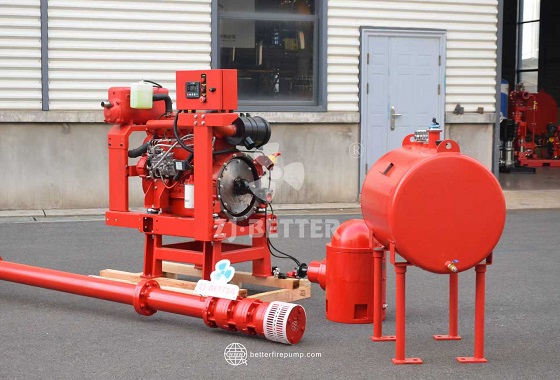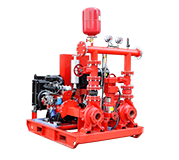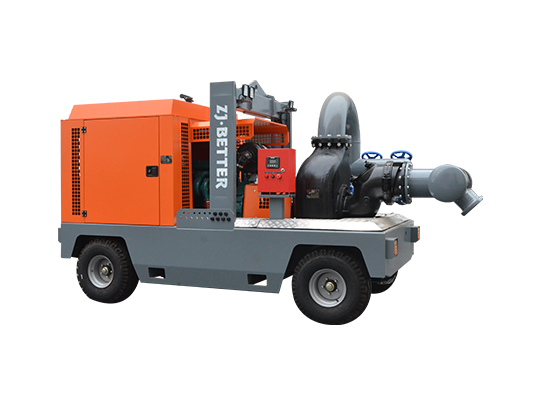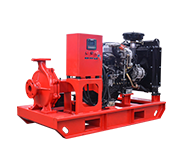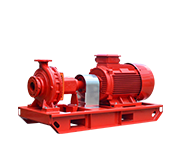In scenarios lacking stable power, far from municipal water supply, or requiring rapid dewatering from deep wells, diesel-powered deep well pumps demonstrate irreplaceable value. By directly driving the vertical deep well pump body through a diesel power system, the equipment can operate independently in emergencies, ensuring continuous water supply during critical moments.
1. Advantages of Diesel Power Systems Providing Stable Driving Force for Deep Well Pumps
Diesel engines, due to their high torque output and reliability, are widely used in fire-fighting water supply systems in environments without electricity. Compared to electric pump systems, diesel engines perform more stably under conditions of large load variations or deep wells. Their fuel supply can be independently controlled, unaffected by power grid fluctuations, making the deep well pumping process safer and more controllable. Diesel power systems can also start quickly in emergencies, ensuring the deep well pump can be operational within a short time. Furthermore, diesel engines have relatively fixed maintenance cycles and long service lives, maintaining stable water supply even under high-intensity and continuous operation conditions. For deep well scenarios, the high torque advantage is particularly significant, meeting the high axial rotational power required for starting long-shaft deep well pumps, reducing problems such as jamming or starting difficulties.
2. Applicability Advantages of Vertical Deep Well Pump Structural Design
Vertical deep well pumps typically employ a multi-stage impeller tandem structure, suitable for lifting water from deeper sources. This structure allows for higher head with lower power output. The pump shaft usually uses a segmented structure connected by couplings, effectively reducing vibration during long shaft operation. In the confined space of deep wells, the vertical pump body can be easily installed inside the wellbore and lift water to the surface through a stable flow guide structure. Furthermore, the vertical layout allows the impeller to extend below the well water level, maintaining continuous water intake even with significant water level fluctuations and minimizing cavitation. The overall structure offers lower footprint, higher stability, and easier maintenance during long-term operation.
3. Durability Design of Deep Well Pump Shaft and Coupling
The long shaft of a deep well pump is crucial to its durability. Operating in the confined space of a deep well, the bending stress, torque transmission capacity, and fatigue resistance of the long shaft directly affect the pump's lifespan. High-quality deep well pumps typically use corrosion-resistant alloy steel or stainless steel as the shaft material. Precision machining ensures the concentricity and straightness of the shaft, maintaining stability in high-speed rotation environments. The coupling transmits power and absorbs minor misalignments between shafts, reducing the possibility of vibration being transmitted to the upper structure. Under continuous operation, the lubrication of the long shaft and the design of the guide bearings are particularly critical. They must not only ensure long-term stable lubrication but also prevent excessive wear under high temperature and high pressure environments. Durable shafts and couplings can significantly reduce maintenance frequency and improve overall reliability.
4. High Head Capacity Achieved Through Multi-Stage Impeller Combinations
The multi-stage impeller structure is the core of the high head performance of deep well pumps. Each impeller stage increases the head, and multiple impellers connected in series can achieve a lifting capacity far exceeding that of ordinary pumps, meeting the high-lift requirements of deep well pumping. Each impeller must maintain precise fit with the guide vanes, bearings, and pump casing during operation; therefore, the wear resistance and dynamic balance of the impeller are particularly important. High-quality impellers are typically made of corrosion-resistant alloy materials and precision cast, capable of withstanding the impact of sand or mineral particles in the well water. Optimized impeller angles and flow channel design reduce hydraulic impact, improve efficiency, and lower energy consumption. In continuous operation, the uniform coordination of multi-stage impellers effectively reduces axial force, thereby improving overall pump stability and extending equipment life.
5. The Role of the Diesel Engine Control System in the Safe Operation of Deep Well Pumps
Diesel deep well pump systems are typically equipped with intelligent control cabinets, enabling rapid response in emergency situations through automated control. The control system includes functions such as oil level monitoring, start-up delay, temperature alarm, low oil pressure protection, and overload protection, making pump operation safer and more reliable. Automated control is particularly important in unattended or remote applications, ensuring automatic start-up when needed and timely shutdown in case of malfunctions. Automated management also allows for periodic self-checks of the diesel engine, extending system lifespan. A reliable control system not only ensures stable operation of the deep well pump but also reduces human error risks, making it suitable for stringent requirements such as 24-hour firefighting standby.
6. Corrosion and Wear Resistance Design to Cope with Complex Downhole Water Quality
Deep well water sources typically contain varying levels of silt, minerals, and microorganisms; therefore, deep well pumps must be designed to resist corrosion and wear. Pump bodies and impellers often utilize cast iron, stainless steel, or wear-resistant alloys to withstand wear caused by long-term water flow. Bearings and seals also require special reinforcement to prevent wear or leakage due to silt intrusion. Some deep well pumps even have special coatings added to the impeller surface to improve their erosion resistance. In industrial groundwater or mine water environments, the water quality is even more complex; therefore, selecting a corrosion-resistant structure can significantly improve the long-term stability of the equipment. Good corrosion and wear resistance not only extends the pump's operating cycle but also reduces maintenance costs and improves the overall system efficiency.
7. Cooling and Lubrication Systems Ensure Continuous Operation of Diesel Pumps
Diesel engines generate a large amount of heat during operation; therefore, the cooling system must be efficient and reliable. Water-cooling or air-cooling structures are typically used, with radiators dissipating heat promptly to prevent overheating of the diesel engine while maintaining combustion efficiency. The lubrication system reduces mechanical friction through oil circulation, keeping moving parts in a low-wear state during high-speed operation. For scenarios involving long-term continuous operation, the continuous stability of the lubrication system is particularly critical, requiring sufficient oil pressure and cleanliness to ensure adequate lubrication of all internal components. Regularly checking oil quality and radiator cleanliness effectively extends engine life, allowing the deep well pump to maintain stable performance under high-intensity conditions.
8. Vibration Control Technology Enhances Deep Well Pump Operational Stability
Vibration control of deep well pumps directly affects their durability and operational performance. Due to the long shaft structure, even slight eccentricity or water hammer can amplify vibrations. Therefore, the equipment design incorporates structures such as guide bearings, dynamically balanced impellers, and flexible couplings to absorb vibrations and reduce the risk of resonance. The mounting base typically uses shock-absorbing rubber pads or a steel structure platform to ensure that vibrations generated by the diesel engine are not transmitted to the pump body. Inside the wellbore, the pump shaft is fixed by multiple guide bearings, keeping it stable during rotation and preventing collisions with the well wall or wear caused by swaying. Vibration control not only extends equipment life but also improves operating efficiency, reduces noise, and enhances the overall user experience.
9. Maintenance Strategies and Lifespan Management of Deep Well Pump Systems
While diesel deep well pumps possess high durability, proper maintenance remains crucial for ensuring long-term stable operation. Maintenance includes: regularly changing engine oil and filters, checking coupling positions, inspecting bearing wear, cleaning the diesel fuel filter, and checking for fuel system leaks. Regularly starting the equipment for trial runs and observing pressure values, fuel consumption, and operating noise should be performed to ensure they are normal. For the downhole components, periodic inspections are necessary to check the impeller and pump casing for wear or scaling. Long-term implementation of the maintenance plan can significantly extend the pump's lifespan, reduce the likelihood of sudden failures, and ensure the equipment is always readily available.
10. The Value of Diesel Deep Well Pumps in Multiple Application Scenarios
Diesel engine-driven vertical deep well pumps excel in scenarios such as fire emergency water supply, rural water conservancy, factory groundwater extraction, remote regional water supply, and disaster relief. Their independence from the power system makes them particularly suitable for extreme conditions such as thunderstorms, earthquakes, and power outages. Its vertical structure allows it to penetrate deep into water sources, unrestricted by geographical conditions, enabling high-lift water supply. The equipment can be quickly deployed, suitable for use in emergency fire trucks or mobile water supply systems. Its stable, efficient, and durable performance makes it highly adaptable to various engineering projects.
Diesel-driven vertical deep well pumps, with their high-torque diesel power, multi-stage impeller structure, highly wear-resistant materials, and intelligent control system, exhibit excellent stability and reliability in complex water sources and extreme environments. Their durable design ensures that the equipment maintains high-efficiency output under long-term continuous operation, making them essential equipment for remote water supply, emergency fire fighting, and industrial pumping systems. Through scientific maintenance and proper application, diesel deep well pumps can significantly improve the safety and sustainability of water supply systems, providing long-term stable assurance for various engineering projects.
